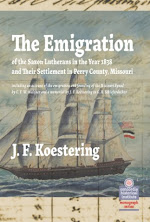
[2024-11-22: added link below in red to a slightly improved translation.]
As mentioned previously, Concordia Historical Institute, in conjunction with CPH, has published an English translation of Pastor J. F. Koestering's 1865 book Auswandering…, in English The Emigration of the Saxon Lutherans in the Year 1838. This book is rich in church history and spiritual counsel and boasts a revised translation by the excellent Matthew Carver. This book is so good that I determined that Koestering's other history, his 1882 companion book on one of the fathers of the Old Missouri Synod, Pastor E. G. W. Keyl, Leben und Wirken des Ehrw. Ernst Gerhard Wilh. Keyl, should also see the light of day in English. And when I read in Koestering's preface that he suggested that this later book, along with his earlier book, would enable the reader to "get an exact idea of the Saxon emigration", I was even more glad that I had pursued this project. Are Koestering's histories reliable… or not?
It is an irony that while the great Walter O. Forster, in his much promoted CPH book Zion on the Mississippi, impugned the reliability of historians Koestering and Hochstetter, yet the editor(s) of the above CPH book by Koestering makes no such criticisms against Koestering. So which is it, LC-MS, is Koestering reliable or not as a church historian? Is Forster "opinionated", as author Stella Wuerffel judged, or not? Let the reader of both of Koestering's books judge for themselves! — Especially enlightening are Koestering's account of Pastor Keyl's relationship to the emigration leader Martin Stephan.
1848 in Germany: "evil Democrats and revolutionaries"
Koestering demonstrates his spiritual understanding of church history by explaining (on page 45) that the upheaval in Germany in 1848 perpetrated by "evil democrats and revolutionaries" was actually the means that God used — evil means at that! — to open up the freedom for a church body to be formed independent of the State in that country, as it is in America. That is how the Lutheran Free Church in Germany was allowed to form.
Notable Quotes:
12: "…rationalism prevailed at all German universities"
12-13: "Most of the [German university] professors taught their students … how they could tear it [the Gospel] out of the people's hearts without noticing it."
33: Martin Stephan "knew how to deceive many, even the authorities, so that he always came out of many investigations as innocent."
39: "Stephanism had its origin in a wrong view of the office of preaching."
99: Pastor Keyl "was a truly orthodox, a genuinely Lutheran preacher and theologian"
133: "Once an apothecary came to Keyl, who was very surprised about the many books that Keyl's library contained." [Keyl had a very extensive personal library]
I have retained all the emphasis of words in the original by underlining them. The translation is not perfect, especially at page breaks, yet it is quite readable. Now I present Pastor Koestering's second great history, in English:
A PDF file may be downloaded at Internet Archive here; a DOCX text file here; a DOCX text file of the original German here.
[2024-11-22 download new improved translation without page breaks >> HERE <<.]
I have not read through the complete book yet even though it is only 159 pages in length. But I plan to do so as I study both of Koestering's histories of the Old Missouri Synod. May other English speaking readers benefit from this great book.

No comments:
Post a Comment
Comments only accepted when directly related to the post.